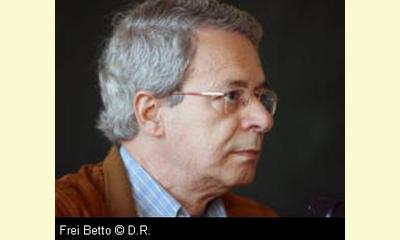|
|
Dominican friar Frei Betto to receive 2013 UNESCO/José Martí Prize
un article par UNESCO Press
UNESCO Director-General, Irina Bokova, has designated the Brazilian Dominican friar Frei Betto as laureate of the 2013 UNESCO/José Martí Prize for his exceptional contribution to building a universal culture of peace, social justice and human rights in Latin America and the Caribbean.

click on photo to enlarge
Ms Bokova selected Frei Betto on the recommendation of an international jury. The prize will be awarded on 28 January in Havana, Cuba, at the Third International Conference on World Balance (28 to 30 January). The conference marks the 160th anniversary of José Martí’s birth.
The laureate was selected in recognition of his work as an educator, writer, and theologian; his opposition to all forms of discrimination, injustice and exclusion; and his promotion of a culture of peace and human rights.
The author of more than 50 books, Frei Betto was born Carlos Alberto Libânio Christo in Belo Horizonte (Brazil) in 1944. He joined the Dominican Order at the age of 20 while studying journalism. During the time of military dictatorship in Brazil, Frei Betto was imprisoned twice, once briefly in 1964 and again from 1969 to 1973.
The UNESCO International José Martí Prize was created in November 1994 by the Executive Board of UNESCO at the initiative of the Government of Cuba. The Prize rewards outstanding contributions by organizations and individuals to the cause of Latin American and Caribbean unity and integration based on respect for cultural traditions and humanist values. The Prize was also established to raise awareness of equity and human rights, particularly among decision-makers.
The previous laureate of the US$5,000 UNESCO/José Martí Prize was Atilio Alberto Borón, a leading Argentinean political scientist, recognized for his tireless intellectual commitment to the unity and integration of countries in Latin America and the Caribbean, as well as his contribution to the study and promotion of José Marti’s thinking.
(Click here for a Spanish version of this article or here for a French version)
|








|
DISCUSSION
Question(s) liée(s) à cet article:
Where in the world can we find good leadership today?,
* * * * *
Commentaire le plus récent:
Once again, as they have done now each year since 2009, the Nobel Women's Initiative provides biographies of 16 women leaders involved in local action for peace and justice around the world, and in particular to stop violence against women. Last year's biographies were listed in the CPNN discussionboard.

|
|









